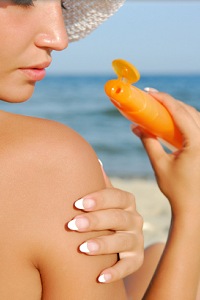Sunscreens FAQ
How often should I use sunscreen?
Sunscreens should be used regularly-for most people, on a daily basis. Any time that you are outdoors for more than 15 minutes, you are exposing your skin to some amount of sun damage, which slowly accumulates over the years. Remember that sunscreen should still be used when the weather is cloudy, or if you plan to go swimming or skiing, as UV light penetrates clouds with ease and reflects off of snow and water, making protection important.
What does broad spectrum mean?
Traditional sunscreens only provided protection from UVB light, which is the spectrum that is responsible for causing sun burn. We now understand that UVA light is just as dangerous, causing long term sun damage such as premature wrinkling, cancerous and non-cancerous tumours.
What is SPF rating?
SPF rating is a measurement that expresses the difference in length of time it takes for the skin to be burned with and without sunscreen. An SPF rating of 15 is supposed to allow a person who burns after 10 minutes of sun exposure to be exposed for up to 150 minutes without burning. There are some caveats to keep in mind, however:
- SPF rating is produced under laboratory conditions-without sweat or water which can remove the sunscreen from the skin, or other cosmetics which can deteriorate the absorption of sunscreen
- SPF rating does not measure the amount of UVA protection that the sunscreen provides. Unfortunately there is no standardized way to measure UVA protection at this time.
- SPF ratings become less accurate at higher numbers (above 30). The reason for this is that sunscreen wears out over time, both through deterioration that occurs through sun exposure itself, factors like exposure to sweat, water, towelling, or skin rubbing against other surfaces. In real life circumstances, the difference between SPF 30 and SPF 50 is not that great, simply because the SPF 30 sunscreen is sufficiently blocking out 97% of UV light already, and both sunscreens will deteriorate over time all the same. We do recommend that a product has at least 15 SPF, as products below this line often do not shut out UV light sufficiently.
Is there a difference between waterproof sunscreens and water resistant sunscreens?
These are technical terms that have been designated by the FDA. A product that is designated water resistant must maintain its advertised SPF level after 40 minutes of exposure to water. A product that is designated waterproof must maintain its advertised SPF level after 80 minutes of exposure to water. These keywords can be important if you plan on swimming outdoors.
Is there a difference between sunscreen and sunblock?
Sunblocks employ ingredients that physically block UV light. Common ingredients are titanium dioxide and zinc oxide. Sunscreens on the other hand, include chemical blockers which contain ingredients that filter and reduce UV penetration into the skin. Avobenzone is an example of a popular and effective chemical ingredient that is used in sunscreens.
- Sunblocks specifically use physical materials which block out sunlight. They are considered to be very effective at shutting out both UVA and UVB light effectively. One disadvantage is that these sunscreens tend to be thicker and do not wash off easily from the skin.
- Sunscreens refer to both physical and chemical sun protection products, and encompass the entire range.
- Both physical and chemical sunscreens are effective, but have its differing strengths and weaknesses.
Do I need to use sunscreens during the winter?
Yes, although the need is lesser than during the summer months where sunlight is longer and stronger. If you have pale white skin and do not tan, however, you should always be using sunscreens. UV light still does cause sun damage during the winter. Another common source of sun exposure occurs during skiing or snowboarding. Both high altitude and snow reflecting UV light, significantly increases exposure, and is a common winter hazard causing many to get sun burned.
Will sunscreens cause vitamin D deficiency?
Sunscreens will block out some of the UV light, which is necessary to form vitamin synthesis, so in theory complete avoidance of sun can contribute to vitamin D deficiency. In practice, dermatologists do not believe that the use of sunscreen is a major detriment to vitamin D intake. A small amount of sunlight (as little as 10 to 15 minutes a week) is sufficient exposure for the body to produce sufficient quantities of vitamin D, at which point, further exposure causes the vitamin to break down as fast as it is produced. Even in people who have almost no sun exposure, vitamin D can be obtained through common food items such as fortified milk, salmon, orange juice, and eggs.
Do dark skinned individuals need sunscreen?
Dark skinned individuals produce more melanin which plays a major role in protecting the skin from sun damage. You could say that they have a natural protection from UV light, compared to those with light or pale skin. Although dark skinned individuals get sun burns much less often, they still need to protect themselves from excessive exposure. Remember that much of the damage that UV light causes is invisible in the short-term, and show up years or decades later in the form of skin problems.
|
 Related websites:
|